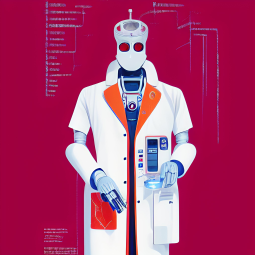Term of the Day: DTx
Today I was reading an article related to headache, and I’m pretty sure it was written by AI, even though the author’s name was right there.

It was rather vague and not particularly helpful. But the day is coming – perhaps is already here – when AI-written content will, at times, be extremely helpful. Of course, it all depends on the programmer, and whoever gave the AI its prompt, and – well, the accuracy of the sources that the AI is drawing from.
Sometimes helpful and sometimes not helpful, AI has become a regular part of life for most of us, along with many apps and data-sharing services and video conferences – and that brings us to our term of the day: DTx.
DTx is more and more of a reality for headache sufferers. It stands for Digital Therapeutics.
Why the x? Well, that’s a long story, as it turns out. You might be familiar with Rx, which refers to a medical prescription. Rx is short for the Latin term recipere (which is where our word “recipe” comes from), which means “take!” Sometimes it would be shortened as Rc, which makes a lot more sense. But there was a habit of crossing the letter to show it was abbreviated – like this: ?. Sorry, just a little history for you there.
DTx is a term that refers to a whole lot at this point. The term was coined back in 2012, and generally refers to treatments that use software/applications/programming and data-sharing (such as over the internet). Proponents, such as the Digital Therapeutics Alliance, want to emphasize that these are evidence-based treatments and tools. In that case, the little app you downloaded that someone invented to make a buck, but that really doesn’t work, would not be included.
Headache and migraine patients are perhaps already familiar with some of these. Let’s list a few:
- Nerivio, the migraine patch that comes with an app
- CEREBRI and other biofeedback devices
- Medisafe, the app that reminds you to take your medication (and can connect with others, such as your doctor)
- Tracking your health information on your phone
- Virtual reality therapy
- Remote doctor/specialist visits
- Waterlogged, an app to remind you to drink your water
- Visiting this website for useful information!
- N1-Headache (formerly Curelator) to help you identify triggers
We could, of course, go on and on! (And it looks like it might be time for some more app reviews.)
Of course, different people define DTx differently, from the wider use of anything digital that you use for your health, to stricter definitions that refer to therapies specifically approved by regulatory organizations. (For an interesting look at the history of DTx, see Role of digital therapeutics and the changing future of healthcare.)
DTx makes a lot of promises. More patient control, ability to track and understand information from home, access to specialists who aren’t nearby, more detailed information.
But there are challenges as well. It’s nice that I can “visit” a specialist in another state, but we all know that there’s a lot that doctors can tell about you in person that they can’t see on a screen. Also, that specialist still only has so much time – what we really need are more trained specialists!
Privacy is another issue. Yes, it’s important to check out how a company will use your information and how secure it is. But as soon as it’s in digital form on a connected device, there’s a chance that it can be accessed by someone else. In fact, there are ways to hack your device so that someone can even tell what you’re typing. “I have nothing to hide” is a phrase used by those who need to learn the many ways that their information can be used against them.
Another concern is just how useful a DTx is (hence “evidence-based”). A “neat-o” device or app may seem great, but it may simply end up as wasted time and more screen time.
One more issue is deciding where to put all your information. You don’t want to waste your doctor’s time (or your own!) with reams of information from 6 different apps. So effectively using digital technology may require some organization on the part of the user.
A recent study briefly investigated the growth of DTx for migraine – you can read more at Digital Therapeutics in Migraine Management: A Novel Treatment Option in the COVID-19 Era. As the report notices, many of these approaches have exploded over the past few years with the lockdown-fueled growth of digital networking.
What do you think? Do you already use digital technologies regularly for your health? What concerns do you have? Leave a comment.
